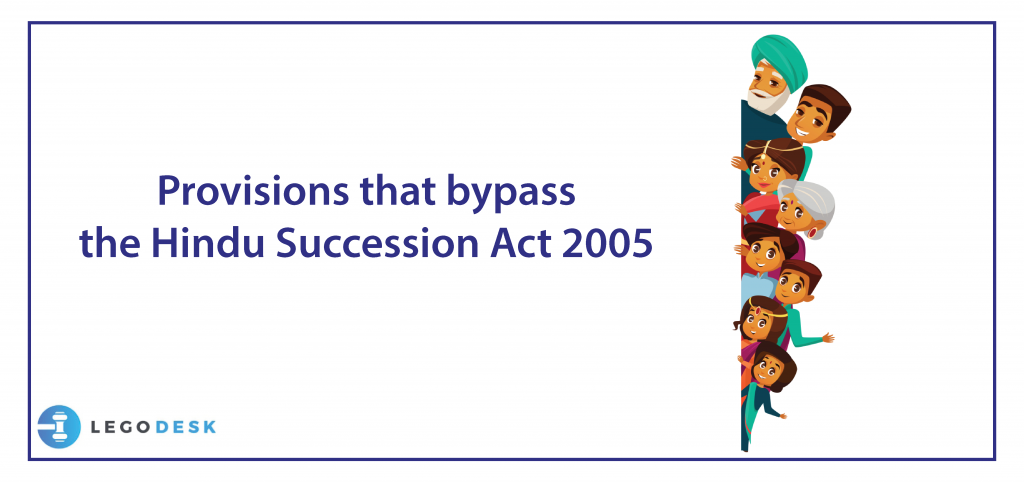Provisions that bypass the Hindu Succession Act 2005
Introduction
In India, the statutes governing the succession of property of an individual are either the acts based on religion or a general code that defines them all. In case of a Hindu, the non-testamentary or Intestate succession of the property is inherited as per the Hindu Succession Act 2005. This depends on the class of heirs, as mentioned in Section 6. This Act is applicable to any person who is a Hindu by religion including those who are a Virashaiva, Lingayat, or a follower of Brahmo, Prarthna or Arya Samaj. The act also extends to the Sikhs and Buddhists not having applicability to any Muslim, Christian, Parsi or Jew as per Chapter 1 Section 2 of the Act. On the contrary intestate succession for a Muslim is carried out according to the Muslim Law of succession. A will of testamentary disposition of property of a Hindu, Buddhist, Sikh or Jain is governed by the Indian Succession Act 1925. Primarily, the Indian Succession Act and the Indian Trust Act can bypass the Hindu Succession Act. This is in case of testamentary succession by a Hindu or creation of a private trust.
The Hindu Succession Act 2005:
The Hindu Succession Act 2005 expressly mentions about the scope of the Act in section 5. It states that:
- The Act does not apply to any property the succession of which is regulated by the Indian Succession Act 1925 as according to section 21 of the Special Marriage Act.
- Any agreement between the ruler of an Indian state and the government mentioning the particulars of a succession of the estate inherited by a single heir.
- The Valiamma Thampuran Kovilagam Estate and the Palace Fund under the palace administration board as per the powers conferred under proclamation IX of 1124 and promulgated by Maharaja of Cochin.
Section 30 of the Hindu Succession Act 2005 clearly specifies that any property capable of being disposed of as according to the Indian Succession Act by way of testamentary succession or a will or in accordance with any other Act for the time being in force can be disposed of by a Hindu.
As per section 14 of the Act which lays down the right of absolute ownership over the property by a Hindu female, subsection 2 specifies that the procedure specified in this section should not apply to any property acquired as a gift or through a well or testament, award or decree by the court that defines restricted ownership of such property to that woman.
These provisions although limited to their context point towards the fact that the provisions in the Hindu Succession Act are applicable to only those devolutions that happen through intestate succession especially confined to the people belonging to the Hindu community. It does not deal with testamentary succession as any devolution by way of a will or gift is governed by the Indian Succession Act 1956.
Read Also: Hindu Undivided Family and its Tax Benefits
The Indian Trusts Act 1882:
The Preamble of the Indian Trusts Act 1882 specifies the objective of the act which is to lay down rules regarding private trusts and trustees.
Section 7 of the Act specifies that every person competent to enter into a contract can form a trust. It can also be created by or on behalf of a minor with the permission of a principal court of original jurisdiction. The persons eligible to form a trust are:
- The Hindu undivided family
- A Minor
- A woman
- Association of persons
- The company as recognized by the Companies Act 2013.
A private trust is any trust constituted for the benefit of a closed group of individuals who could be definitely ascertained in a given time. Private trusts can be either formed inter vivos or by way of a will. If the formation of the will includes a will, then the private trust will be governed by the Indian Succession Act of 1956.
Read Also: Succession Rights of Daughter
Special Marriage 1954 :
Hence, the provisions of the Special Mariage Act also bypass the Hindu Succession Act and are governed partly by the Indian Succession Act.
Conclusion
The Hindu Succession Act came into being as a result of the Mitakshara and co-parcenary system with an aim to regulate the succession of property amongst its members of the joint Hindu family. However, due to the realization of civil and fundamental rights of individuals, women, and children, special laws were enacted. This gave way to the formation of special kinds of institutions/ marriages that were formerly not recognized due to social constraints and lack of awareness. The business was simplified by the allocation of definite rules for the Hindu Joint families who wished to form private trusts. All four statutes discussed above have a different set of objectives and are carefully drafted for convenience and ease of interpretation. What is common is the diversity of laws made for communities and communities alike in order to promote just, fair, and equitable rights of its citizens. These rights now translate into specific duties enshrined in each of the acts overriding one another and ensuring uniformity and order in the society.
Try our Debt Resolution solutions today Request a Demo
